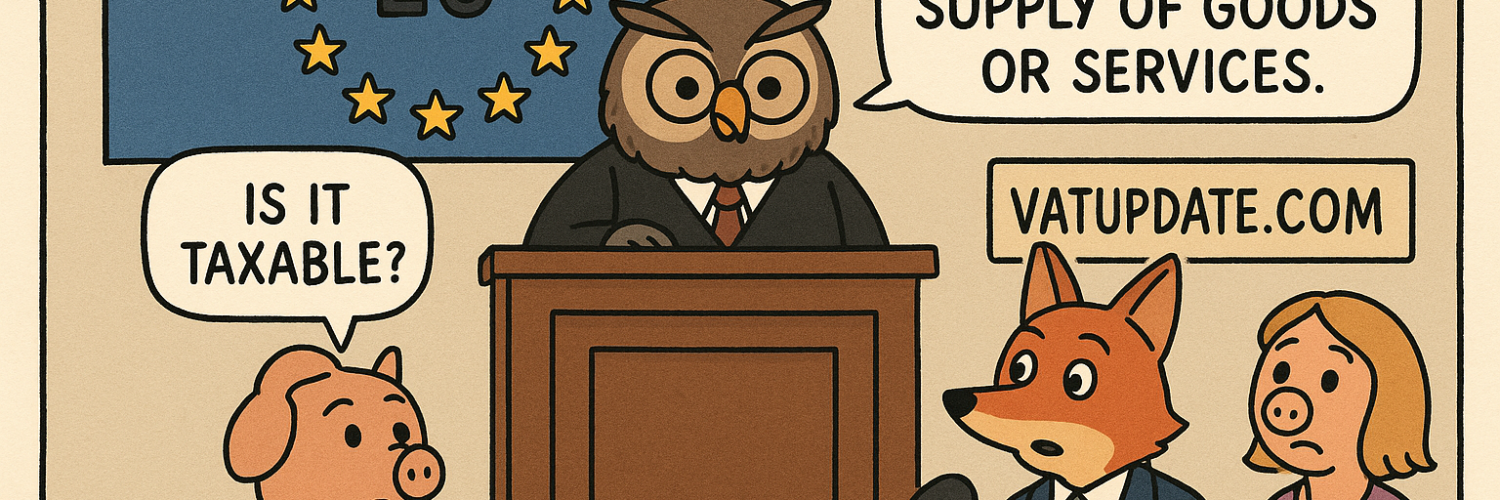This briefing document reviews the main themes and most important ideas and facts regarding the application of EU Value Added Tax (VAT) to barter transactions, based on the provided sources, including case law from the Court of Justice of the European Union (CJEU).
I. Core Principles: Taxability of Barter Transactions
The fundamental principle is that barter transactions, which involve the exchange of goods or services for other goods or services (consideration in kind), are generally subject to VAT under the same conditions as transactions involving monetary consideration. This is explicitly supported by the VAT Directive and confirmed by the CJEU.
- Definition of Taxable Transactions: Article 2(1)(a) and (c) of the VAT Directive states that both the supply of goods and the supply of services for consideration within a Member State by a taxable person acting as such are subject to VAT.
- Barter as “For Consideration”: A transaction is considered “for consideration” if there is a direct link between the supply and the consideration received. This direct link arises from a legal relationship with reciprocal performance, where the remuneration is given in return for the supply. The key point is that the consideration does not have to be monetary. The CJEU in Serebryannay vek (paragraph 39) emphatically states: “barter contracts, under which the consideration is by definition in kind, and transactions for which the consideration is in money are, economically and commercially speaking, two identical situations“.
II. Barter as Reciprocal Supplies
A crucial concept highlighted in the sources is that barter transactions are treated as two separate, reciprocal supplies. Each party to the exchange is considered both a supplier and a recipient.
- The ECJ Serebryannay vek judgment specifically addressed this in the context of services: “reciprocal supplies of services, such as fitting out and furnishing an apartment in exchange for the right to use it, constitute supplies for consideration.”
- The ECJ A Oy case further reinforces this, finding that both demolition contracts and purchase contracts for dismantling involving non-monetary consideration comprise two transactions: a supply of services and a supply of goods (or vice-versa).
III. Determining the Taxable Amount in Barter Transactions
A significant aspect of VAT on barter is the determination of the taxable amount when consideration is not in money.
- General Rule: Article 73 of the VAT Directive states that the taxable amount includes “everything which constitutes consideration obtained or to be obtained by the supplier, in return for the supply, from the customer or a third party.”
- Value of the Consideration Received: In barter, the taxable amount for each supply is the value of the goods or services received in exchange. This value is considered to have a subjective value, representing what the recipient attributes to the services/goods received and what they are prepared to spend for that purpose. This subjective value must be capable of being expressed in monetary terms. The Naturally Yours Cosmetics case, cited in Empire Stores (paragraph 18), establishes that “the consideration taken as the taxable amount in respect of a supply of goods is a subjective value, since the taxable amount is the consideration actually received and not a value estimated according to objective criteria.”
- Determining Subjective Value: Where a monetary value is not explicitly agreed, the sources indicate methods for determining this subjective value:
- In Naturally Yours Cosmetics, concerning a supplier providing goods at a reduced price in exchange for the retailer’s service of arranging sales parties, the value of the service was determined as “the difference between the price actually paid for that product and its normal wholesale price“.
- In A Oy, the value of the scrap metal received in exchange for demolition services (Scenario 1) or the value of dismantling services provided in exchange for goods (Scenario 2) was considered to be the value the demolition company attributed to that supply and factored into the overall price calculation (either increasing the demolition price or reducing the purchase price of the goods).
- Open Market Value: In certain situations, particularly between associated persons or to prevent tax evasion, national legislation (like Bulgarian Law Article 27(3)) and the VAT Directive (Article 80) may mandate the use of the open market value to determine the taxable amount. The “EU VAT on Barter Transactions” source notes that “The value attributed to the exchanged items must be factored into the taxable amount, ensuring it reflects economic and commercial reality.”
- Technical Difficulties: Technical difficulties in determining the value of the exchanged items do not negate the existence of consideration (A Oy, paragraph 42).
IV. Chargeable Event and Chargeability
The sources clarify when VAT becomes due on barter transactions.
- Chargeable Event: Article 62 defines the “chargeable event” as “the occurrence by virtue of which the legal conditions necessary for VAT to become chargeable are fulfilled.”
- Time of Supply: Article 63 states that “The chargeable event shall occur and VAT shall become chargeable when the goods or the services are supplied.”
- For barter deals, this means VAT becomes chargeable when the reciprocal supplies of goods or services are made. The “EU VAT on Barter Transactions” source explicitly states: “For barter deals, this would be when the reciprocal supplies are made.”
V. Case Examples and Their Significance
The CJEU cases provide concrete examples illustrating these principles:
- Serebryannay vek (Case C‑283/12): This case established that the right to use and let property can be valid consideration for services rendered to improve that property. The exchange of improvement services for the right to use the apartments was deemed a supply of services for consideration, even though no monetary rent was paid. The Court’s ruling is a direct affirmation: “Article 2(1)(c) of Council Directive 2006/112/EC… must be interpreted as meaning that a supply of services to fit out and furnish an apartment must be regarded as having been carried out for consideration if, under a contract concluded with the owner of that apartment, the supplier of those services, first, undertakes to carry out that supply of services at its own expense and, secondly, obtains the right to have that apartment at its disposal in order to use it for its business activities during the term of that contract, without being required to pay rent, whereas the owner recovers the improved apartment at the end of that contract.”
- A Oy (Case C‑410/17): This case provided important clarification on the treatment of contracts involving both services (demolition/dismantling) and goods (scrap metal/items to be dismantled). It confirmed that such contracts often comprise two distinct taxable transactions. The key takeaway is that even if the value of the non-monetary consideration (scrap metal or dismantling service) is not explicitly agreed or known to both parties, it constitutes consideration if the taxable person attributes a value to it and factors it into the overall pricing. The Court’s rulings on the two scenarios illustrate this:
- Scenario 1: “that contract consists of a supply of services for consideration… and also a supply of goods for consideration… if the purchaser… attributes a value to that supply of goods, which it factors in when calculating the price quoted for the performance of the demolition works…“
- Scenario 2: “that contract consists of a supply of goods for consideration… and also includes a supply of services for consideration… if that purchaser attributes a value to that supply of goods which it factors in to the price quoted as a factor reducing the purchase price of the goods to be dismantled…“
- Naturally Yours Cosmetics (Case 230/87): This case (referenced in Empire Stores) is foundational in establishing that the consideration for a supply of goods can consist of a provision of services, provided there is a direct link and the value can be expressed in monetary terms. It also introduced the concept of determining the subjective value of the service by looking at the difference between the price paid and the normal price of the goods.
- Empire Stores (Case C-33/93): This case applied the principles from Naturally Yours Cosmetics to a loyalty scheme where customers received goods without extra charge for introducing new customers. The introduction service was considered the consideration for the free goods, and the taxable amount was determined to be the price paid by Empire Stores for those goods. This case further solidified the principle of a direct link between the supply of goods and the service provided. The Court ruled: “Article 11A(1)(a) of the Sixth Council Directive… must be interpreted as meaning that the taxable amount in respect of an article supplied without extra charge to a person who introduces herself or another person as a potential new customer is distinct from the taxable amount in respect of the goods bought from the supplier by the new customer and corresponds to the price paid by the supplier for that article.“
VI. Practical Implications
Based on the sources, businesses involved in barter transactions should be aware of the following practical implications:
- Each exchange in a barter arrangement constitutes separate, taxable supplies for VAT purposes.
- The value of the goods or services received as consideration must be determined for each supply to calculate the taxable amount. This value should reflect economic reality and, where possible, be based on open market value, especially between associated parties.
- VAT invoices should generally be issued for both supplies in the barter transaction, indicating the determined value.
- VAT becomes chargeable when the reciprocal supplies are made.
In summary, the sources demonstrate a consistent approach within EU VAT law to treat barter transactions as taxable events. The focus is on identifying the reciprocal supplies, establishing a direct link between them, and determining the taxable amount based on the subjective value attributed to the consideration received, capable of monetary expression, with the possibility of using open market value in specific circumstances.
In these series ….
Podcasts & briefing documents: VAT concepts explained through ECJ/CJEU cases on Spotify
See also
- C-230/87 (Naturally Yours Cosmetics) – The taxable amount is a subjective value which must be capable of being expressed in monetary terms
- C-33/93 (Empire Stores) – Delivery, without additional payment, of article to person who registers himself or another as a new customer
- C-283/12 (Serebryannay vek) – Barter deal: Services supplied for free in return for not paying rent
- C-410/17 (A Oy) -Barter deal – VAT Implications for Demolition Contracts
- Roadtrip through ECJ Cases – Focus on Taxable transactions – Barter deals
- Join the Linkedin Group on ECJ/CJEU/General Court VAT Cases, click HERE
- VATupdate.com – Your FREE source of information on ECJ VAT Cases
Latest Posts in "European Union"
- 2025 Global VAT / GST Changes
- Understanding Fiscal Representatives
- Comments on ECJ C-375/24: Application of reduced VAT rate to puzzle books with number Sudokus
- EU Directive on New VAT Rules for Imported Goods Effective August 2025
- Enhancing VAT Compliance: Real-Time Reporting and Control Statements to Combat Fraud














